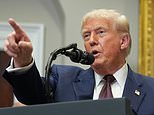Donald Trump’s decision to largely spare Australian goods from new tariffs marks a significant diplomatic win for the Albanese government, defying earlier speculation of escalating trade tensions. This outcome, hailed as a ‘vindication’ by Australia’s trade minister, underscores the ‘cool and calm’ approach taken in recent international diplomacy, especially concerning US trade.
While the US president unveiled a fresh wave of global tariffs on various trading partners, most Australian exports will continue to incur only the existing 10 percent baseline tariff, avoiding the higher levies seen elsewhere. This outcome is particularly noteworthy given the strong internal American pressure for increased duties on Australian products, a key aspect of US trade policy.
Trade Minister Don Farrell confirmed that President Donald Trump resisted calls to elevate the tariffs, opting instead to maintain the current rate. He emphasized that this decision is a testament to Prime Minister Anthony Albanese’s understated yet effective strategy in managing the crucial relationship with the United States, a clear win for Australian politics.
Prior to this announcement, concerns mounted that Australian goods could face harsher levies. Speculation was fueled by Prime Minister Albanese’s unsuccessful attempts to secure a direct meeting with the US president, compounded by Mr. Trump’s recent statements hinting at a broader 15-20 percent ‘tariff for the world,’ impacting global tariffs.
Despite this positive development, Australia remains committed to advocating for a full exemption from US tariffs. Senator Farrell has extended an invitation to US Commerce Secretary Howard Lutnick for ongoing discussions, though the ultimate success of these negotiations remains uncertain, highlighting ongoing international diplomacy efforts.
In stark contrast to Australia’s favorable outcome, other nations, including New Zealand, Fiji, and Papua New Guinea, will face increased tariffs, with New Zealand’s goods subject to a 15 percent levy. More punitive rates have also been imposed on major US trading partners such as Canada and India, set to take effect on August 7, reflecting broader global trade shifts.
The White House justified these increased tariffs on countries that either failed to engage constructively in negotiations with the US or did not sufficiently align on economic and national security objectives, outlining a clear stance on international trade partnerships and their expectations from the United States.
Interestingly, the Albanese government recently relaxed biosecurity restrictions on US beef imports. While ministers assert this timing was coincidental, the US had previously voiced complaints about non-tariff barriers, and the lifting of these restrictions was notably celebrated by Mr. Donald Trump as a beneficial step for the US-Australia economic ties, further intertwining Australian politics with US trade.






Leave a Reply